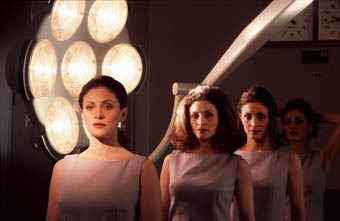A monstrous science
Anni Davey

Maria Theodorakis, The Teratology Project
photo Ponch Hawkes
Maria Theodorakis, The Teratology Project
Directed by Susie Dee and written by Wayne Macauley, The Teratology Project demonstrates the power of context in presenting complex ideas. Delivered with ease and wit by great performers from the Institute of Complex Entertainment, the work was staged at the former Preston and Northcote Community Hospital. Teratology is the study of monsters, fashionable at the turn of the last century. The Teratology Project reveals science itself to be monstrous and vanity its champion.
After submitting a DNA sample on entering the hospital, the audience is divided into 3 groups. We wait in the ward where The Doctor (Brian Lipson) informally shows us some exhibits—pictures of cloned babies, a life-size cast of a cadaver. Then we are separated and move to the first room where the performer Maria Theodorakis waits. She tells us she is one of 4 sisters, all born to different women; she is the only one to whom their biological mother gave birth. We meet 3 of the sisters in 3 successive rooms, none similar, each reacting differently to their captivity. In the fourth room we encounter a body covered by a bloody sheet. The mother enters and explains that she has bred her ‘children’, 28 in all, to provide a supply of youthful exteriors. She has just lifted the face from the fourth clone and masked herself with it.
The doctor guides us through the corridors stalked by an ambiguous figure in a fashionably retro brown suit carrying a portable record player. We are left to wait in the autoclave room and told not to touch anything. In a fish tank is one dead mouse, which has made the whole room reek. We are then guided to a wardroom with a bed enclosed by curtains. The Doctor reveals an old man (Bruce Kerr), who at 168 years has been kept alive in a hospital bed connected to an external fish tank containing a pig’s heart. The old man tells us that he has lost all his memories. They have tried to implant some pleasant ones but none stick. All he can remember is a field of cows but he doesn’t know if it’s his memory. The man in the brown suit enters and plays a strange waltz on his record player. The old man gets out of bed and dances with Death—but the Doctor drags him back, reviving him again. Death wanders off down the corridors.
The Doctor then reveals a woman (Sally Hildyard) eating bananas and with the most enormously pregnant belly propped up before her. The Doctor inserts a lipstick camera into the belly and we are introduced to the child. Angus Cerrini plays a recalcitrant clone of Jesus Christ, conceived in a test tube from an ancient drop of blood on a sliver of the cross, and who at 32 years old continues to refuse to be born. The symbiotic relationship between mother and child is more erotic than maternal.
The whole audience is then gathered together. We watch Death and the old man waltz off together, Death finally triumphant. But the Doctor has a surprise. He tells us that his life’s work has been to destroy Death. He brings Death in strapped to a wheelchair and is about to kill him with a hypodermic needle when we are interrupted by a man, Etienne Grebot, in full French gumshoe regalia. He demands that the prisoner be read his rights and proceeds to argue the defence, producing pictures of cute babies as evidence that the final removal of Death also removes any hope of new life. Finally Death is released and waltzes with the Doctor in a last macabre number.
Institute of Complex Entertainment, The Teratology Project; writer Wayne Macauley; director Susie Dee; former Preston and Northcote Community Hospital, Melbourne, Nov 26-Dec 7, 2002
RealTime issue #53 Feb-March 2003 pg. 36






